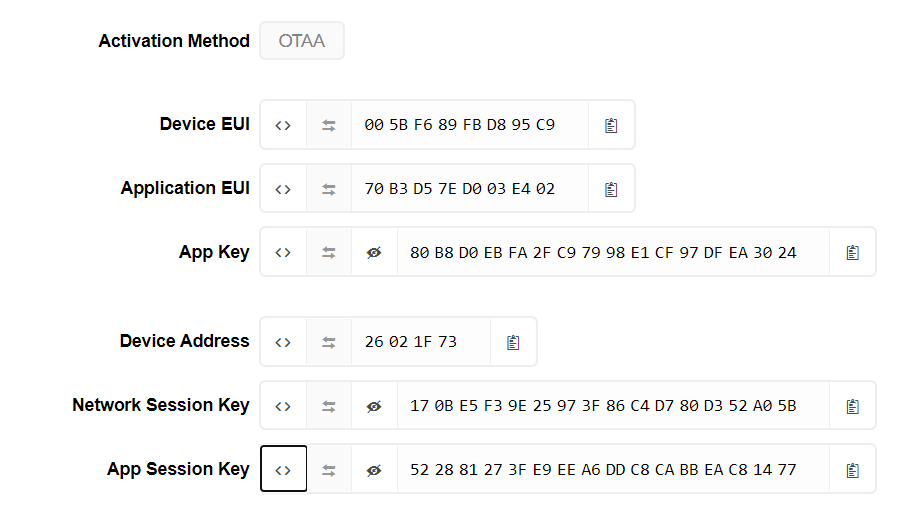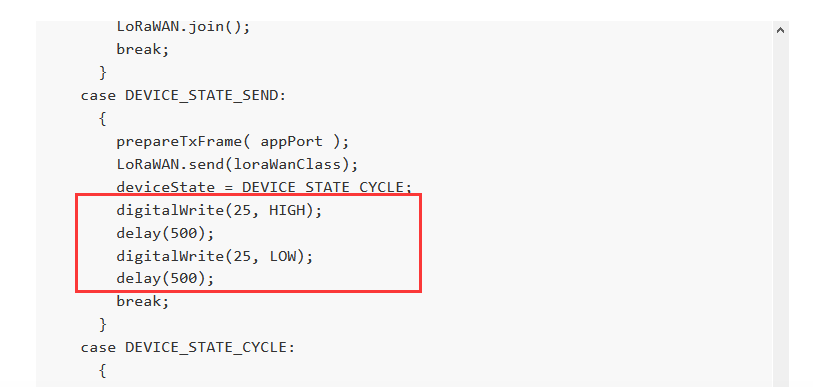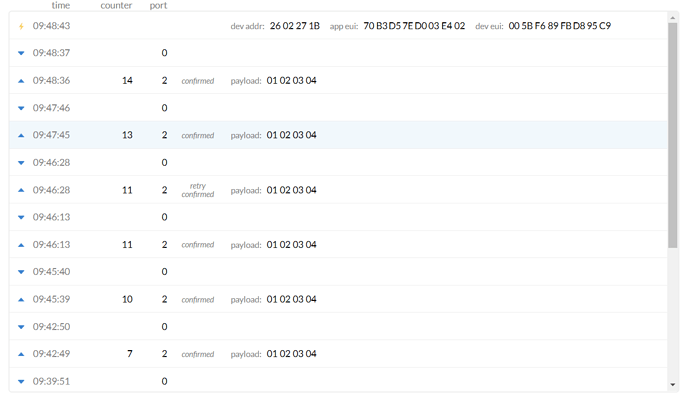I’m using a wireless stick lite, with the OTAA example, attempting to connect to TTN with a TTN gateway. (This one: https://www.amazon.com/gp/product/B08L6BWNJR?pf_rd_r=KZBAJHNHP3FVV4XGASCY&pf_rd_p=5ae2c7f8-e0c6-4f35-9071-dc3240e894a8&pd_rd_r=37e9ef09-8f56-4b67-a828-e0d7ea4da96b&pd_rd_w=b3Ozp&pd_rd_wg=cwLmU&ref_=pd_gw_unk)
So far, I have been able to get it to work every once in a great while, incredibly frustrating. Tried both OTAA and ABP, both have extremely inconsistent results. Should see a message every 15 seconds, but 10 minutes can pass before I see a new message.
Below is the sketch I’m using, and the TTN settings as well. Note that I’ve also turned frame counting off.
Arduino sketch:
/*
HelTec Automation(TM) LoRaWAN 1.0.2 OTAA example use OTAA, CLASS A
Function summary:
- use internal RTC(150KHz);
- Include stop mode and deep sleep mode;
- 15S data send cycle;
- Informations output via serial(115200);
- Only ESP32 + LoRa series boards can use this library, need a license
to make the code run(check you license here: http://www.heltec.cn/search/);
You can change some definition in "Commissioning.h" and "LoRaMac-definitions.h"
HelTec AutoMation, Chengdu, China.
成都惠利特自动化科技有限公司
https://heltec.org
support@heltec.cn
this project also release in GitHub:
https://github.com/HelTecAutomation/ESP32_LoRaWAN
*/
#include <ESP32_LoRaWAN.h>
#include "Arduino.h"
/*license for Heltec ESP32 LoRaWan, quary your ChipID relevant license: http://resource.heltec.cn/search */
//chipID = B04583910250
uint32_t license[4] = {0x06309046, 0x8D56EEF8, 0xEA59B397, 0x891F4E72};
/* OTAA para*/
uint8_t DevEui[] = { 0x00, 0x5B, 0xF6, 0x89, 0xFB, 0xD8, 0x95, 0xC9 };
uint8_t AppEui[] = { 0x70, 0xB3, 0xD5, 0x7E, 0xD0, 0x03, 0xE4, 0x02 };
uint8_t AppKey[] = { 0x1A, 0xDB, 0x92, 0x28, 0x74, 0xCB, 0x8C, 0xB8, 0x95, 0x85, 0xD7, 0xAA, 0x32, 0x86, 0x4E, 0x06 };
/* ABP para*/
uint8_t NwkSKey[] = { 0x86, 0x1E, 0x83, 0xAD, 0xB9, 0x6C, 0x3D, 0x80, 0x11, 0xF8, 0x7C, 0x17, 0x69, 0x62, 0xBA, 0x34 };
uint8_t AppSKey[] = { 0xBD, 0x17, 0x6B, 0xAE, 0xB0, 0x88, 0x1D, 0xB0, 0xB8, 0x65, 0x20, 0x62, 0x73, 0x27, 0x23, 0xA7 };
uint32_t DevAddr = ( uint32_t )0x26021B8F;
/*LoraWan channelsmask, default channels 0-7*/
uint16_t userChannelsMask[6] = { 0x00FF, 0x0000, 0x0000, 0x0000, 0x0000, 0x0000 };
/*LoraWan Class, Class A and Class C are supported*/
DeviceClass_t loraWanClass = CLASS_A;
/*the application data transmission duty cycle. value in [ms].*/
uint32_t appTxDutyCycle = 15000;
/*OTAA or ABP*/
bool overTheAirActivation = true;
/*ADR enable*/
bool loraWanAdr = true;
/* Indicates if the node is sending confirmed or unconfirmed messages */
bool isTxConfirmed = true;
/* Application port */
uint8_t appPort = 2;
/*!
Number of trials to transmit the frame, if the LoRaMAC layer did not
receive an acknowledgment. The MAC performs a datarate adaptation,
according to the LoRaWAN Specification V1.0.2, chapter 18.4, according
to the following table:
Transmission nb | Data Rate
----------------|-----------
1 (first) | DR
2 | DR
3 | max(DR-1,0)
4 | max(DR-1,0)
5 | max(DR-2,0)
6 | max(DR-2,0)
7 | max(DR-3,0)
8 | max(DR-3,0)
Note, that if NbTrials is set to 1 or 2, the MAC will not decrease
the datarate, in case the LoRaMAC layer did not receive an acknowledgment
*/
uint8_t confirmedNbTrials = 8;
/*LoraWan debug level, select in arduino IDE tools.
None : print basic info.
Freq : print Tx and Rx freq, DR info.
Freq && DIO : print Tx and Rx freq, DR, DIO0 interrupt and DIO1 interrupt info.
Freq && DIO && PW: print Tx and Rx freq, DR, DIO0 interrupt, DIO1 interrupt and MCU deepsleep info.
*/
uint8_t debugLevel = LoRaWAN_DEBUG_LEVEL;
/*LoraWan region, select in arduino IDE tools*/
LoRaMacRegion_t loraWanRegion = ACTIVE_REGION;
static void prepareTxFrame( uint8_t port )
{
appDataSize = 4;//AppDataSize max value is 64
appData[0] = 0x01;
appData[1] = 0x02;
appData[2] = 0x03;
appData[3] = 0x04;
}
// Add your initialization code here
void setup()
{
Serial.begin(115200);
//while (!Serial);
SPI.begin(SCK, MISO, MOSI, SS);
pinMode(25, OUTPUT);
digitalWrite(25, HIGH);
delay(500);
digitalWrite(25, LOW);
delay(500);
Mcu.init(SS, RST_LoRa, DIO0, DIO1, license);
deviceState = DEVICE_STATE_INIT;
}
// The loop function is called in an endless loop
void loop()
{
switch ( deviceState )
{
case DEVICE_STATE_INIT:
{
LoRaWAN.init(loraWanClass, loraWanRegion);
break;
}
case DEVICE_STATE_JOIN:
{
LoRaWAN.join();
break;
}
case DEVICE_STATE_SEND:
{
prepareTxFrame( appPort );
LoRaWAN.send(loraWanClass);
deviceState = DEVICE_STATE_CYCLE;
digitalWrite(25, HIGH);
delay(500);
digitalWrite(25, LOW);
delay(500);
break;
}
case DEVICE_STATE_CYCLE:
{
// Schedule next packet transmission
txDutyCycleTime = appTxDutyCycle + randr( -APP_TX_DUTYCYCLE_RND, APP_TX_DUTYCYCLE_RND );
LoRaWAN.cycle(txDutyCycleTime);
deviceState = DEVICE_STATE_SLEEP;
break;
}
case DEVICE_STATE_SLEEP:
{
LoRaWAN.sleep(loraWanClass, debugLevel);
break;
}
default:
{
deviceState = DEVICE_STATE_INIT;
break;
}
}
}
Join event from gateway:
{
"gw_id": "eui-58a0cbfffe8030d9",
"payload": "AALkA9B+1bNwyZXY+4n2WwBvMXTT410=",
"dev_eui": "005BF689FBD895C9",
"lora": {
"spreading_factor": 8,
"bandwidth": 500,
"air_time": 28288000
},
"coding_rate": "4/5",
"timestamp": "2021-02-26T18:04:54.136Z",
"rssi": -44,
"snr": 10.25,
"app_eui": "70B3D57ED003E402",
"frequency": 904600000
}
Accompanying serial port message (note, TTN sees join request, but device says join failed? Can only seem to get data through sometimes on ABP mode…):
TX on freq 903000000 Hz at DR 4
DIO0:TX Done
RX on freq 923300000 Hz at DR 13
DIO1:RX Timeout
RX on freq 923300000 Hz at DR 8
DIO1:RX Timeout
TX on freq 903300000 Hz at DR 0
DIO0:TX Done
RX on freq 926300000 Hz at DR 10
DIO1:RX Timeout
RX on freq 923300000 Hz at DR 8
DIO1:RX Timeout
join failed, rejoin at 30000 ms later
TTN settings and logs:
Yet another odd thing I noticed, while in ABP mode the few messages that get through all have extremely low RSSI, ~-109dB, which is strange since the devices are within a few feet of each other and are line of sight…
Any and all input would be appreciated, I’m tearing my hair out over here.






